
The human resource department deals with various tasks like talent acquisition, employee retention, benefits & compensation, employee records, payroll processing, and ensuring compliance with a long list of laws & regulations so that your company doesn’t get sued. Out of all these core functions, if your business were to compromise on any front, it would stand to lose out on its culture, scaling capacity, retention of talent, and more. Since neither of these is something any business would stand to lose, how do businesses with tight budgets manage to get it done?
It’s simple, they outsource it to third parties, and here’s why. It’s a competitive world out there. Companies cannot afford to compromise on benefits or any other facilities and functionalities in this day and age. That is why having good HR in place pays subtle dividends in the long run. And to know how small businesses manage to get it done, we will need to learn how they are different from big conglomerates.
THE DISTINCTION BETWEEN WHITE-COLLAR BEHEMOTHS AND SMBS
The first and foremost thing that sets big corporations apart is the budget and resources they have at their disposal. Looking at the limitations faced by small businesses, the systems, resources, and scale of their operations are modest. These situations demand the HR personnel in SMBs to get creative in terms of employee retention, talent & skill development, benefits, recruitment, maintaining core values, and developing policies.
Some small businesses can’t afford to appoint dedicated people for specific HR tasks and processes. Such organizations don’t believe in single-skilled specialists. This is where generalists are preferred over specialists. In emerging companies, the company owner or the manager has to play multiple roles other than their core responsibilities and take up HR activities like recruiting, creating policies, and managing payroll. Now that the distinction is clear enough, the next question is: Are SMBs at a disadvantage?
Restricted budget and resources, along with other constraints, may paint a negative picture of small businesses, but it cannot be farther than the truth. SMB’s may not have significant retirement plans or a long list of benefits for people to choose from, but people still prefer to work for such organizations nonetheless. It is because they trade benefits for perks that are hard to resist. Perks such as flexible working, casual dressing, and mentoring opportunities compensate for goodies and other amenities that one might get in large corporations. In addition, most SMB’s ensure compliance to the mandatory laws & regulations by outsourcing the compliance and other HR processes to third-party service providers. This makes for a laid-back yet work-focused work environment.
CONCLUSION
In the long run, when it comes to HR management in SMBs and big corporations, both of them are practically the same story, narrated in different languages. Even though SMBs operate with tighter budgets and resources as compared to the big leagues, they simply get the HR work done by either a third-party or by repurposing their current expertise. Either way, HR has become absolutely necessary and emerging enterprises are not compromising on that front.
Source: connecteam.com | study.com | globenewswire.com | fool.com | shrm.org
DISCLAIMER: The information on this site is for general information purposes only and is not intended to serve as legal advice. Laws governing the subject matter may change quickly, and Exela cannot guarantee that all the information on this site is current or correct. Should you have specific legal questions about any of the information on this site, you should consult with a licensed attorney in your area.





